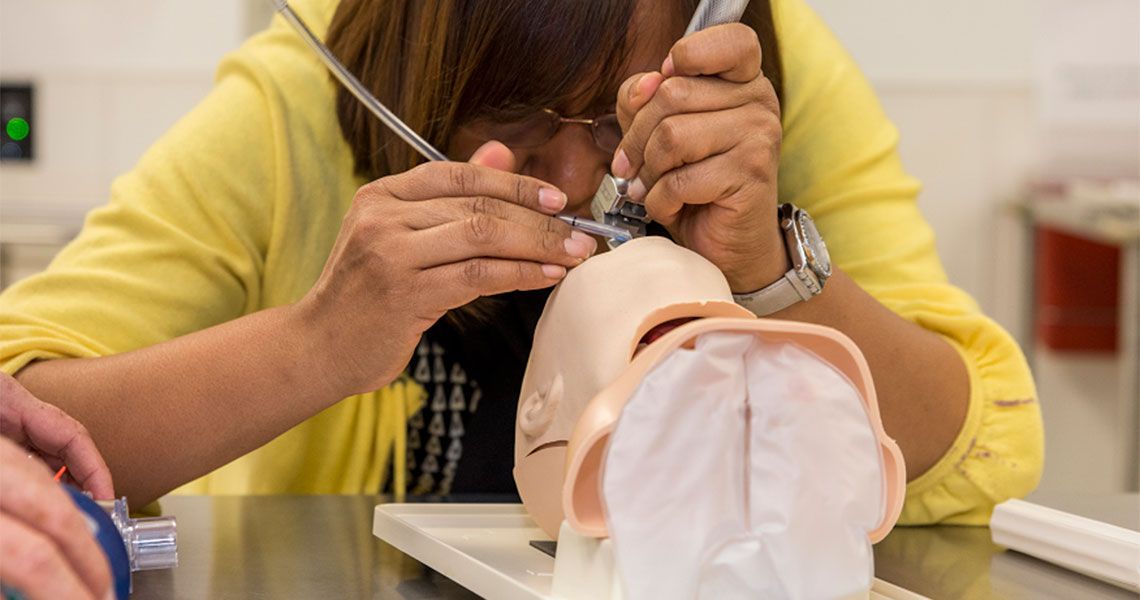Two dozen anesthesiologists from 14 countries around the globe were deep in discussion, exploring best practices during a practical review of pediatric anesthesiology, at the GW School of Medicine and Health Sciences’ (SMHS) Ross Hall in May 2016. The question posed to them — “What’s worked, and what hasn’t?” – spurred comments on surgical team communication methods, upper respiratory infections, and patient safety.
“We have global standards for Operation Smile,” explained Khaled Tolba, M.D., an anesthesiologist from Egypt.
Operation Smile, an international medical charity co-founded by SMHS alumnus Bill Magee, M.D. ’72, D.D.S., provides free surgeries for children and young adults with cleft lips, cleft palates, and facial deformities in developing countries. Key to this 34-year effort has been the organization’s relationship with the GW Office of International Medicine Programs (IMP).
“Our long-lasting partnership with Operation Smile has allowed hundreds of thousands of patients to benefit from surgery and has allowed our students, faculty, and alumni at GW to close the gap in health equity,” said Huda Ayas, Ed.D. ’06, M.B.A. ’98, M.H.S.A. ’93, associate dean for international medicine and executive director of IMP.
More than 30 volunteers from GW have participated in Operation Smile missions over the last decade, and for the last two years, IMP has contributed to Operation Smile’s annual MediCon training series by offering intensive hands-on medical instruction for physicians from around the world.
Tolba and his colleagues, for example, participated in the international pediatric anesthesiology training, coordinated by IMP and led by Anna Katharine Hindle, M.D., assistant professor of anesthesiology and critical care medicine at SMHS, and Stanley M. Knoll, M.D., medical director of IMP and professor of surgery at SMHS. After instructional sessions run by experts from GW and the university’s clinical partner Children’s National Health System, Hindle led the group in analyzing how they deal with potential challenges — like the aforementioned upper respiratory infections, which can make surgery on young patients more complex.
“What I have done in my practice is I first [talk to] the mother,” said Ernesto Albornoz, M.D., an anesthesiologist from Colombia. “I directly ask her, ‘Do you think your child has the flu? Do you think your child is sick? Do you think your child should have the surgery?’ Most of the time, you can see even the moms who want their kid to go to the [operating room] will say, ‘I don’t think he’s in the best condition.’ ”
Tolba, in response, added that Operation Smile has standards in place — no surgeries on cleft lips before the patient is 6 months old, no surgeries on cleft palates before the patient is a year old — and the surgical staff works together as a team. Continuity is key. Mission leaders, Tolba said, are not the clinicians with the most experience or the most education, but the volunteers who have completed the most Operation Smile missions. Consistency among the supplies is an important part of how the charitable organization systemizes its approach, as well; the same kind of equipment, donated by Operation Smile, is used for every mission.
GW, supporting those missions through its expert-led workshops and simulated exercises, welcomed the Medicon participants to its Clinical Learning and Skills Simulation (CLASS) Center. There, the participants enhanced their knowledge of administering anesthesia to infants and children through hands-on, real-time training while familiarizing themselves with Operation Smile practices and protocols. Using patient simulators, or mannequins, they also brushed up on essential procedures, such pediatric resuscitation and ultrasounds, in a mock operating room in highly realistic scenarios.
Thanks to this supplemental training, GW and IMP continue to support the objectives of Medicon, which in turn provides the anesthesiologists with a platform for skills-sharing while also highlighting their mission to help children in need. The mutual learning that results extends far past what participants learn at the CLASS Center; one participant, for example, presented on a technique he uses on Operation Smile missions that the GW instructors had never performed.
This reciprocal relationship between the Operation Smile volunteers and GW is at the heart of IMP’s mission, explained Ayas. “Our history of collaboration has made a difference in the lives of families around the world,” she said. “This is the kind of work and the kind of partnership we believe in and will continue to support.”



